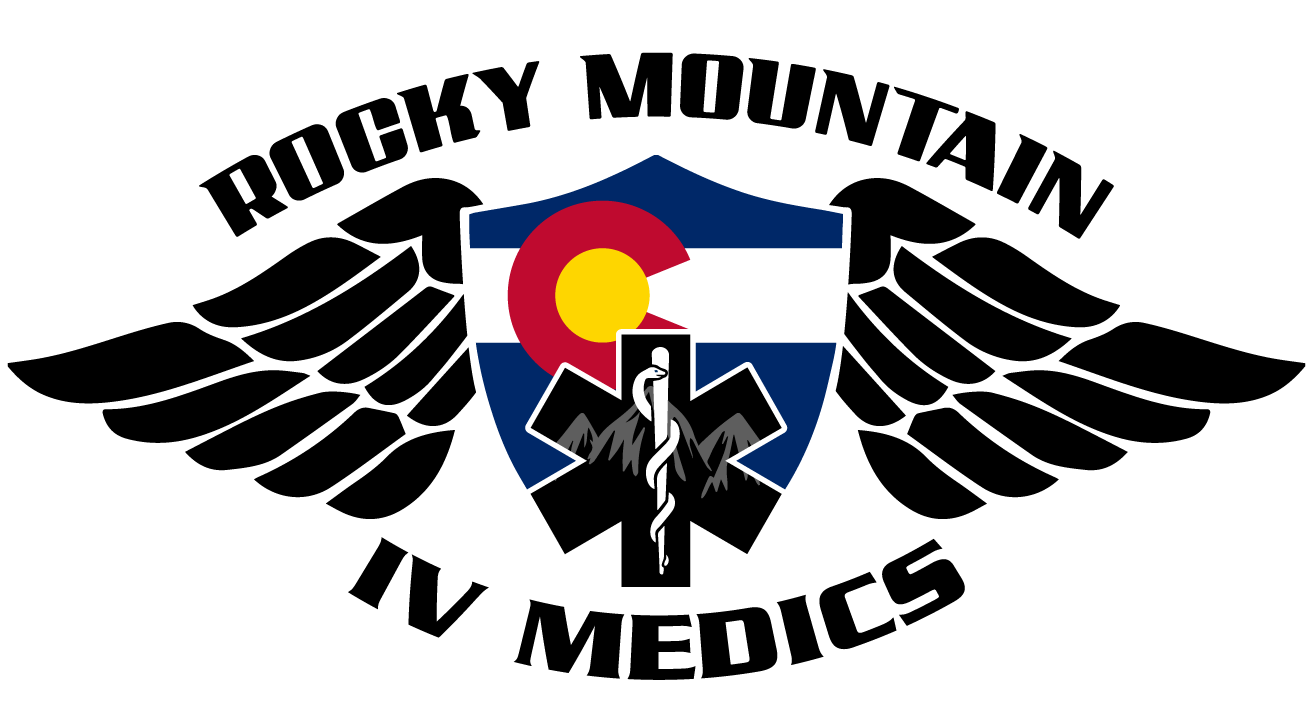What’s in Your IV? Exploring Our Treatment Ingredients

The Flu vs Stomach Flu: A Guide to Symptoms & Relief
July 1, 2021
Vitamin D: Benefits, Uses & Why You Need It
July 28, 2021What’s in Your IV? Exploring Our Treatment Ingredients

Table of Contents
- What Is IV Fluid Made Of?
- Saline
- Vitamin B Complex
- Vitamin B12
- Vitamin C
- Vitamin D
- Glutathione
- Magnesium
- Zinc
- Pepcid
- NAD+
- Toradol
- Zofran
- Benadryl
- Taurine
- Reglan
At first glance, an IV drip bag looks unassuming. But take a closer look, and you’ll understand that what is in an IV bag is actually fascinating.
At Rocky Mountain IV Medics, we pride ourselves on using only the best, medical-grade IV drip ingredients. These vitamins, minerals and electrolytes are essential for a healthy body that functions at its best every day.
The quality of our ingredients is important. That’s because IV infusions deliver fluids straight to the bloodstream for maximum absorption and the utmost effectiveness. Even the vitamins and minerals you consume in the foods you eat or the oral vitamin supplements you take aren’t fully absorbed like IV fluids because you have to digest them first. This is why you may experience immediate, powerful results from IV therapy, whether you need symptom relief during an illness or want to enhance your well-being with a sharper mind and bountiful energy. We understand that what’s in your IV drip matters.
What Is IV Fluid Made Of?
All of our drip IVs start with a sterile saline solution. We then add combinations of vitamins or minerals, depending on the objectives we want to achieve. What’s in an IV fluid for hangovers, for instance, may differ from what we use in a drip IV for athletic recovery.
In addition to our lineup of IV packages, we also give you the flexibility to customize your treatment for a specific purpose. We can add vitamins, minerals and medications to any of our IVs. What’s in your IV hydration fluids is up to you, and our medical professionals will work with you to select the proper course of treatment.
Understanding the different vitamins, minerals and medications available for IV treatment can help you make the most informed decisions for your health.
Saline
IV fluids combine sodium chloride and sterile water. Our saline solution uses 0.9% sodium chloride.
- The water in IV fluids rehydrates the body, which is about 60% water.
- Sodium chloride provides electrolytes. These perform several roles in the body, such as tissue repair, blood pressure balance and muscle and nerve support.
- Dehydration upsets the body’s delicate balance of water and electrolytes, and IV fluids restore that balance. The saline solution helps mitigate the physical and psychological effects of dehydration, such as mental confusion and aching joints.
- Saline fluids are an effective delivery mechanism for medications, vitamins and minerals as they’re infused into the blood. They provide maximum absorption of these vital nutrients in the body, so you get the best results from your IV treatment.
- The 0.9% sodium chloride solution is considered an isotonic IV solution. It’s similar to the volume of particles in the blood plasma, so it keeps a fluid balance inside and outside of the body’s cells.
Vitamin B Complex
We refer to vitamin B Complex as the building blocks of the body. This group contains B1 (thiamine), B2 (riboflavin), B3 (niacin), B5 (pantothenic acid) and B6 (pyridoxine).
- B Complex vitamins work together to supply energy to the body.
- They also maintain optimal cellular health, brain and nerve function, muscle tone, eyesight and digestion, among other functions.
- These water-soluble vitamins also help reduce oxidative stress caused by free radicals. This means B Complex can help slow the signs of aging that are caused by oxidative stress, such as wrinkled, less firm skin.
- B Complex is also recommended for pregnant women to ensure healthy brain development in their babies and help prevent birth defects.
- You can be deficient in B Complex vitamins if you don’t get enough of them in your diet (especially if you are vegetarian or vegan), or if you’re age 50 or older and have difficulty absorbing vitamins.
- B1 helps provide the body with cellular energy.
- B2 promotes red blood cell production.
- B3 repairs DNA, neutralizes free radicals to prevent damage and helps with cellular metabolism.
- B5 assists with fat breakdown.
- B6 produces blood hemoglobin that transports oxygen throughout the body.
Vitamin B12
This vitamin (also called cyanocobalamin) is concentrated in animal products, so people on plant-based diets or those who can’t absorb B12 due to a digestive disorder may need B12 supplementation.
- Vitamin B12 is essential for energy, red blood cell production and healthy neurological and central nervous system function.
- B12 may also support healthy immunity by creating red blood cells that deliver oxygen to the immune system’s cells.
- A lack of B12 may lead to fatigue or anemia. In serious cases, it could affect your memory function and increase the risk for dementia or depression.
- Like B Complex, vitamin B12 can also help guard against birth defects, as well as lower of risk premature birth.
- Some studies indicate that B12 contributes to healthier bones and eyes by decreasing the risk of osteoporosis and macular degeneration, respectively.
Vitamin C
Vitamin C, or ascorbic acid, isn’t just great for fighting colds. You can also use it to maintain your overall health at a high level.
- Vitamin C is an antioxidant that fights free radical damage caused by exposure to pollution, UV light and other environmental factors.
- The vitamin also aids in iron absorption and collagen production. The latter can benefit the skin, whether it’s healing from a cut, incision or wound, or if your complexion shows signs of aging.
- Vitamin C can also support a strong immune system. This will help you fight off cold and flu germs or lessen the frequency and duration of an illness.
- You may be able to boost your cardiac health with vitamin C. Research indicates this vitamin may help lower high blood pressure and levels of LDL cholesterol. These are two major risk factors for heart disease.
- The antioxidant power of vitamin C may guard against cognitive issues such as memory impairment.
Vitamin D
Our bodies need this vitamin to maintain health in many ways.
- Incorporate vitamin D for bone and immune system health, cardiovascular and circulatory support, mood-lifting and improved digestive health.
- A vitamin D deficiency can occur if you don’t get a lot of sun exposure; your body needs sunlight to produce this vitamin. You may need to supplement with vitamin D if you are indoors most of the day or wear sunscreen that blocks UV rays from the body. You’ll know you have a deficiency if you have a lot of aches and pains in your body, especially in the bones and muscles.
Glutathione
Glutathione is an antioxidant that reduces oxidative stress, the cellular damage caused by free radicals.
- Try glutathione for potential symptom relief related to autoimmune and inflammatory diseases.
- It may also help with liver health by naturally detoxing the body and clearing fats from the liver.
- Glutathione also plays a role in DNA creation, immune system support and sperm cell formation, among other functions.
- Preliminary research links low glutathione levels to insulin resistance (which can cause diabetes) and increased symptoms of Parkinson’s disease. The use of glutathione in treating diseases is an area ripe for further research.
Magnesium
Magnesium is considered a macronutrient. That means you need to get a substantial amount of it every day, compared to other minerals that are categorized as micronutrients. Generally, you should get 100 mg of magnesium each day.
- Low levels of magnesium may cause cramps, mood swings, migraines and other symptoms.
- Magnesium IVs ease symptoms of migraines and asthma attacks, help maintain low blood pressure and may help women suffering from preeclampsia seizures.
- Studies show that magnesium could lower the risk of diseases such as type 2 diabetes and heart disease. The mineral may also help ease the painful symptoms associated with migraines.
- Magnesium is essential for strong bones. Not only does it increase bone density, but it also helps ensure that your body has enough calcium and vitamin D, which are two other nutrients necessary for bone health.
- Athletes may take magnesium supplements in an IV to increase energy levels and promote muscular health.
Zinc
Zinc is known to help ease cold symptoms, but it has several other uses, too.
- Use zinc to diminish acne, slow the progress of macular degeneration and heal wounds and inflammation.
- Like glutathione and vitamin C, zinc has antioxidant capabilities that help lower disease risk by diminishing the oxidative stress caused by free radicals in the body.
- Low zinc levels can increase the likelihood of certain medical issues, including infections, macular degeneration and fertility problems in men.
- Proper zinc consumption is especially important for pregnant women and children to ensure healthy development.
- Zinc is typically consumed in foods such as fish, beans and meat. A zinc deficiency can be caused by a diet low in zinc, difficulty absorbing zinc in the body or diseases such as cancer and diabetes.
Pepcid
This is the brand name for the generic medication famotidine. It’s a more potent version of the over-the-counter heartburn medication that uses a histamine blocker to reduce stomach acid.
- Pepcid eases symptoms associated with ulcers, gastroesophageal reflux disease (GERD), indigestion and heartburn.
- It can also be used for flare-ups of Zollinger-Ellison syndrome, in which a tumor causes the body to make too much ulcer-producing gastric acid.
- This medication is designed for short-term use.
NAD+
The body produces this coenzyme (full name: nicotinamide adenine dinucleotide) to convert food into energy. It’s essential to life because it governs more than 500 enzymatic reactions in the body. NAD+ does everything from promoting stem cell production to regulating metabolism.
- NAD+ is believed to repair DNA, sharpen brain function, set the body’s circadian rhythms and slow down the signs of aging.
- Everyone starts life producing an ample supply of NAD+ by synthesizing NAD precursors into NAD. NAD+ signifies NAD is in its oxidized form. Unfortunately, those NAD+ levels go down as we age and the body doesn’t produce as much of it.
- Many people struggling with substance abuse have found that NAD+ IV therapy helps the body detoxify and curbs cravings. NAD+ doesn’t cure addiction but can be used to support recovery as part of a comprehensive rehabilitation program.
Toradol
This type of nonsteroidal anti-inflammatory drug (NSAID) is designed to relieve severe pain from surgery, injury or medical conditions like migraines. Its generic name is ketorolac.
- Toradol decreases prostaglandin, which inflames tissue at the site of the pain.
- It’s not addictive and non-narcotic.
- Toradol is meant for short-term use.
Zofran
Zofran is the brand name for ondansetron, which prevents nausea and vomiting.
- This is an ideal add-in for people who have the flu or food poisoning, as well as anyone nauseous as a result of surgery or chemotherapy.
- Zofran is sometimes prescribed to pregnant women struggling with intense morning sickness that can’t be alleviated with other therapies.
Benadryl
This well-known antihistamine may reduce allergy-related symptoms.
- It’s the brand name for diphenhydramine.
- Benadryl may improve the severity of rashes, itchy and watery eyes, runny nose, coughing and sneezing.
- In addition to allergies, it’s also used for cold symptoms and bug bites that make skin painful and itchy.
Taurine
Taurine doubles as an antioxidant and an amino acid. It’s produced in the body for healthy organ and tissue support.
- Use it to ease anxiety symptoms and support mental and physical health.
- Athletes take taurine to reduce lactic acid after workouts, support muscle health and rebalance electrolyte levels.
- Your metabolism relies on taurine to make bile salts, which are necessary for the body to break down cholesterol.
- A taurine deficiency may increase the risk of degenerative eye and neurological issues.
Reglan
Reglan is a short-term medication that addresses digestive problems.
- Add Reglan to your IV if you’re suffering from nausea, vomiting, heartburn or gastroesophageal reflux disease (GERD).
- It eases symptoms by moving food through the gastrointestinal tract.
Contact Rocky Mountain IV Medics
Contact Rocky Mountain IV Medics for high-quality IV therapy. Book an appointment online today.


